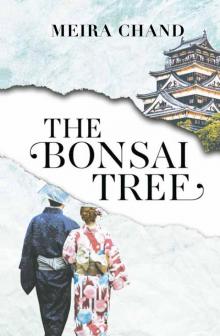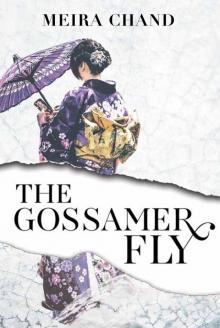- Home
- Meira Chand
The Gossamer Fly
The Gossamer Fly Read online
© Meira Chand 1979
First published in 1979 by John Murray (Publishers) Ltd
This new edition published by Marshall Cavendish Editions in 2018
An imprint of Marshall Cavendish International
All rights reserved
No part of this publication may be reproduced, stored in a retrieval system or transmitted, in any form or by any means, electronic, mechanical, photocopying, recording or otherwise, without the prior permission of the copyright owner. Requests for permission should be addressed to the Publisher, Marshall Cavendish International (Asia) Private Limited, 1 New Industrial Road, Singapore 536196. Tel: (65) 6213 9300. E-mail: [email protected]
Website: www.marshallcavendish.com/genref
The publisher makes no representation or warranties with respect to the contents of this book, and specifically disclaims any implied warranties or merchantability or fitness for any particular purpose, and shall in no event be liable for any loss of profit or any other commercial damage, including but not limited to special, incidental, consequential, or other damages.
Other Marshall Cavendish Offices:
Marshall Cavendish Corporation. 99 White Plains Road, Tarrytown NY 10591-9001, USA • Marshall Cavendish International (Thailand) Co Ltd. 253 Asoke, 12th Flr, Sukhumvit 21 Road, Klongtoey Nua, Wattana, Bangkok 10110, Thailand • Marshall Cavendish (Malaysia) Sdn Bhd, Times Subang, Lot 46, Subang Hi-Tech Industrial Park, Batu Tiga, 40000 Shah Alam, Selangor Darul Ehsan, Malaysia
Marshall Cavendish is a registered trademark of Times Publishing Limited
National Library Board, Singapore Cataloguing-in-Publication Data
Name(s): Chand, Meira.
Title: The gossamer fly / Meira Chand.
Description: First edition. | Singapore : Marshall Cavendish International (Asia) Pte Ltd, [2018] | Original publisher : John Murray (Publishers), 1979.
Identifier(s): OCN 1039422194 | eISBN 978 981 4828 62 8
Subject(s): LCSH: Japan--Social life and custom--Fiction. | Japan--Fiction.
Classification: DDC S823.914--dc23
Printed in Singapore
Cover design by Lorraine Aw
For
Nissim Ezekiel
… that intangible thing they call a
gossamer-fly flitted across his path.
‘Now you are caught’ I cried, and
thought I held it safe.
But when I looked the gossamer-fly
had vanished –
vanished or never been in my hand.’
Such was the poem that he recited, sitting alone.
The Tale of Genji by Lady Murasaki
1
That Summer was a first growing up. And after it the rustle of grass, the view of the bay, each thing she touched were never the same, but filled with the menace of a dark adult world. Like a ceiling upon a tall room.
Then, it was the tick of the clock, unswerving, going on after everything stopped, which possessed her nightmares. That, and the russet iron faces of Japanese armour standing in her father’s study. These walked forever towards her, slowly. Each step a clump of metallic scales and a ripple of shoulder flaps, as if a wind was caught beneath. Their faces, carved in flanges and ridges, were ferocious as the wind god. The blue-laced one had a sparse white beard, the other a hog-hair moustache. But their eyes were the same, empty dead slits, blacker than their faces.
In her mind everything began on that first day, when she found the new maid, Hiroko, in the kitchen, with chopsticks pulling white flakes of fish from the bones, eating her lunch. The room smelled of yellow radish pickle and the fish, charred on a wire stand over a flame. Hiroko picked up a slice of pickle between wooden chopsticks, and took a sharp bite. She did this exactly, taking her time, ignoring Natsuko who had come into the room and stood near the table. Finally she raised her head.
‘Are you the daughter? You look like your mother.’ Her eyes were still, without expression, staring across the table.
‘Is your mother American or English? It’s strange you’re blonde like her, and don’t have your father’s Japanese hair. My sister once worked in an orphanage for half-blood Japanese children, after the war. I went there once. I must have been your age, nine or ten. I saw all kind of weird faces, especially the ones with Negro fathers. But I never saw any with hair like yours.’ Hiroko looked at Natsuko critically, and gave a sudden harsh laugh.
Immediately then Natsuko knew she would not like her. And that, for some reason of her own, Hiroko had decided this. Still, she sat at the other side of the table and watched across a green checked cloth. But Hiroko continued to observe her silently, until Natsuko felt yellow and thin, rinsed through by inexplicable shame. Then, still without speaking, Hiroko took another bite of pickle, and returned her gaze to the food. Natsuko watched the lower half of her face, moving elastically to the crunch of radish.
Three days before her parents had interviewed Hiroko. Afterwards Natsuko slipped quietly into the lounge. She sat on the floor, running a finger around a stain on the surface of an occasional table. Shutting the front door behind Hiroko, Natsuko’s mother came slowly back into the room.
‘No,’ she said, shaking her head. ‘I do not like her. She is not the right type. Unless we are careful she will have men, all kinds, through the back window.’
She said the words primly, but her eyes fixed boldly upon her husband. In the chair she leaned wearily, blonde hair hanging limply to the curve of her jaw.
‘She has worked in a tearoom, a bar, a factory and one of those neon-lighted cabarets in Shinshaibashi. She could have been a stripper for all we know. What does she want to come here for? It strikes me always, there are only two types of women here in Japan. The wives and the bar girls. Ladies or sluts. It is quite clear in which category Hiroko fits.’
Kazuo Akazawa closed his book with an abrupt snap. ‘You are quite wrong in your attitude. But what shall we do? You know how hard it is to find help. You seem unable to manage the house any longer yourself. You’ve been unwell for a long time now. Nobody else answered our advertisement. If you would only not be so obstinately proud and ask my family, they might find somebody with a recommendation. That would be best.’ His expression prepared for a new chapter of friction.
At once Frances Akazawa’s eyes flicked open. ‘No. I will not ask. We will keep her. We will try. She may be all right, you never know.’
She said it quickly, twisting her rings. Knotting restless hands in her lap, she closed her eyes upon it all. Kazuo shrugged, pursed his lips and reopened his book. Silence filled the room. They sat in their chairs, cold and hard, all the unsaid words lodged between them.
Crouched at the table Natsuko examined inlaid chips of mother of pearl, smelling the unhealthy odour. Later the words would break out, cracking and frothing from them like frozen water in a bottle. In bed in the dark, she would hear it all. It was the same each night. Even with her head beneath the pillow the angry splintered words sank into her, filling her with fear. The decision was no victory for her mother, just another tired weight, and a colder tightening to her father’s mouth.
Hiroko’s half-eaten sphere of pickle rested on top of a mound of rice. From its centre a grainy texture radiated out, faintly, like a watermark. Lipstick smudged the bitten edge. Opening off the kitchen was the small room Natsuko had helped her mother clear for Hiroko the day before. Besides the vacuum cleaner and ironing board, a disused birdcage, cushions, carrier bags and boxes of oddments were pulled from the room. Also a large metal trunk that had accompanied the Akazawas’ on the boat to Japan, after they met and married in England. Frances greeted each object with a groan, wondering where to dispose of it. At last the room was clear and curtains hung at the window. Natsuko found a w
all vase, decorated with a garish picture of geisha, and filled it with two pink camellias from the garden.
The door was open, the room unoccupied yet by Hiroko. Her belongings stood in the middle of the floor; a cardboard box done up with blue string and two large bundles tied in brightly patterned carrying cloths. Dumping them there she had come immediately into the kitchen to eat. Sodden newspaper wrapping from the fish lay on the draining board, the white a dull wet grey. Upon the table, in the metal lunch box, were the rice and pickles she had brought with her. And Natsuko noticed their own blue flowered teapot, the smallest one, a faint line of steam drifting from the spout. There was no sound now from the radish in Hiroko’s mouth, just a few softened yellow particles stuck around her teeth.
But staring at the table Natsuko thought, she has opened the cupboards, found the pot and the box of green tea leaves. All this she has done by herself, without help. Pushing into their cupboards, touching cups, moving plates and glasses, looking behind neat piles for the teapot. Her presence disturbed the kitchen, something new pervaded the air. Its ownership was shared.
Lifting the pot by its wicker handle, Hiroko poured tea into a small bowl. A leaf swirled up to the surface and disappeared instantly beneath the stream. Taking the bowl in both hands she sipped loudly several times, and then looked directly at Natsuko.
‘Now you had better show me around,’ she said, standing up.
Together they walked through the house, Natsuko in front. From behind came the flip flop of Hiroko’s felt slippers. In woollen socks Natsuko’s own feet slipped upon the polished wood. Thin gaps between the boards pressed into the flesh of her heel, cold and hard. Trailing behind, Hiroko commented at the number and size of rooms, the length of passages, at the dirt on top of picture frames. But in the study, before the two suits of armour, sitting side by side in front of a screen, the sword collection upon the wall, and the glassed shelves of books, she stood a moment, silent. Then, from the back of her throat came a short harsh note of surprise, like a bird. Natsuko was pleased, in spite of her own dislike of the house. For the sunless rooms and passages, the shiny paneled walls, the crytomeria in the garden with views of the bay in gaps between, the bulbous prongs of the stair rail, these things could be counted, on and on. Quantity alone put them beyond Hiroko’s reach. Natsuko turned with satisfaction to climb the stairs. They went first to the end of the passage, into her parents’ bedroom.
It was the biggest room upstairs, different from the rest of the house. The downstairs rooms were dark, trees pressed up against their windows. The light filtering through was as green and mottled as the murky world of a fish tank. But here, in Kazuo and Frances Akazawa’s bedroom, light and a panoramic view of Osaka bay streamed in, unhampered. The room appeared to hang suspended, part of the elements and the sky. But, in this room Natsuko always felt apprehensive, fearing any moment it might blow off into the sky.
Hiroko rushed excitedly to the window. Her arms pushed down hard and straight upon the ledge, a tendon pulled taut inside her wrist.
‘What a view. It’s wonderful.’ Her breath frosted the glass, in a round furry circle. When she stood back it remained there opaque, beneath the greasy mark of her nose.
She turned next to take in the room, and immediately Natsuko tensed, conscious of each object, particularly the four dead and shriveled roses, in a china jug on a bedside table. The black fingers of a pair of gloves, hanging from a drawer of the dressing-table, would not hide themselves, and the mirror irritatingly reflected these things.
Turning her head slowly Hiroko took in everything in turn. Natsuko held her breath, anxious to keep pace. Each object came under Hiroko’s scrutiny and receded. Dust covered boxes on top of the wardrobe, a pile of clothes left loosely on the bed, a wastepaper basket overflowing with tissues, slippers kicked into a corner. From the bedside table Hiroko picked up a photograph of Natsuko and her brother Riichi, running hand in hand on a beach. Putting it down she took up one of Kazuo Akazawa, upon the steps of the university. At this she stared much longer.
‘She’s not tidy, is she?’ said Hiroko at last, turning down the corners of her mouth. Wiping a finger over the shoulders of bottles on the dressing-table, she pushed into a group the eyedrops and the vitamins. Then, leaning forward, a hand casually on the dressing-table, she inspected her face in the mirror, patting her hair, moistening her lips. Next she walked to the bed and gave a small tug to straighten the cover. A silky blouse slipped from a pile of clothes lying there. Hiroko glanced at it and with a shrug turned to the cupboard.
But Natsuko still stood at the dressing-table, unable to lift her eyes, feeling more and more uneasy. For, stencilled in light dust on the glass surface, were the fingermarks of Hiroko’s hand. They stared up crudely, branding the room. They would lie there all day and all night until dusted off. Her parents would sleep here, unknowing. The unease grew deeper, for she knew she had been mistaken. Nothing would ever be beyond Hiroko’s reach. Just the flick of her eye, or the touch of a finger drew each thing to her. And afterwards they were no longer the same, but filled by her presence and possession.
Trying not to appear anxious Natsuko stepped forward. The bedcover touched her leg, slippery and cool. She saw Hiroko’s hand on the cupboard door, turning the handle, opening it. Quickly then, lowering an arm, Natsuko rubbed her jersey covered wrist across the dust, pressing down hard on the fingermarks, until upon the dressing-table a great hole was torn in the dirt, and the fingermarks appeared gone. Brushing her arm she stepped back, relieved. The light moved with her, and she saw amongst the shadows of cosmetic bottles that the fingermarks had surfaced again. Although the imprint was fainter, the whorls and the texture of Hiroko’s skin still lay ingrained on the glass, like the paw marks of an animal in wet cement.
Laughter came suddenly then from behind her, coarse as gravel, making her start. Turning quickly, she saw coming towards her, dancing and twitching, her mother’s yellow shantung dress. Above it Hiroko’s face grimaced and laughed. Immediately Natsuko’s stomach contracted in alarm, thinking how Hiroko must have found and pulled on the dress. Then, from behind the yellow pleats, she saw the green slither of Hiroko’s skirt, the dress was still on its hanger. Hiroko clutched it to her, an arm across the waist. It hung before her like a limp rag doll.
‘One, two, three … one, two, three …’ Twirling around, Hiroko danced. The yellow dress jiggled about, pulled on the hanger right and left. Between Hiroko’s open red lips, her white teeth gleamed, her tongue curled pinkly against the dark hollow of her throat. Humming tunelessly she came towards Natsuko, jerking in spasms from side to side with strange mechanical intensity.
Terrified at such abandonment Natsuko shouted for Hiroko to stop, putting her hands over her eyes. But through cracks between fingers she saw her still whirling about. Caught up in her humming and the twitching yellow dress, she took not the slightest notice of Natsuko.
‘One, two, three. One, two, three.’ She danced on. Natsuko turned and ran to the window. Outside it was snowing. Gauzy flakes flew at the window, stuck for an instant to the glass, then dissolved to pinheads of water. Hiroko’s turning body brushed her own, throwing her back against the window. Natsuko felt the glass, thin and icy beneath the soft stuff of her sweater. Hiroko danced on, limbs and skirts leaping about her.
At the dressing-table again Hiroko paused, reaching out to the trinket box there, flipping back the lid. A thin tinny music started, notes pinging precisely at staccato intervals. A key in the side of the box turned slowly round and round. In the lid a little ballerina revolved, stiff and netted, like a speared moth. Hiroko pulled out a string of pearls. Clattering against the side of the box they caught briefly around the key, before she swung them over her head. Then, laughing, she was off once more, round and round, again and again.
Natsuko pushed back against the window again as Hiroko whirled past. And for an instant Natsuko saw herself, minute, reflected in the lustre of each small pearl. A pale blob of face, a red smear of j
ersey, she swung out in multitude about Hiroko’s neck. Panic filled her then.
‘Stop it! Stop it!’ she screamed.
Hiroko danced past. The yellow dress touched Natsuko’s leg. A fragment of her mother’s perfume tore free and floated back.
Then suddenly Hiroko was falling, down upon the bed. The dancing finished, as abruptly as it started. Panting and laughing she lay there, the yellow dress spread over her, her body sunk deep into the mattress, the satin stripes of the bedcover about her. The beads lay still, flung sideways onto the pillow. Her legs stuck straight out before her, one bent slightly, the other straddling the pile of clothes on the bed, scattering some upon the floor. Between her legs a broad triangle of thigh showed white and blatantly against the green skirt, then darkness.
Natsuko stood by the bed, staring at Hiroko’s face glowing up from the blue striped cover, skin stretched taut and smooth over her high flat cheekbones. Her body heaved with sobs of laughter. At that angle her eyes appeared no more than two narrow slits, the light within them devious and wild.
‘Natsuko. Natsuko.’ Frances Akazawa’s voice was near, climbing the stairs.
In an instant then Hiroko swung from the bed, straightening the cover as she turned. Into the cupboard she quickly shoved the yellow dress. The hanger stuck out awkwardly, a yellow shoulder hitched up high. Forcing the door shut upon it she bent to the fallen clothes, dumping them in a heap on the bed. Then, pushing past Natsuko she stuffed the beads back into the trinket box.
When Frances Akazawa came into the room they stood again together in the frame of the window, silent and watchful. Smiling faintly, Frances pushed the hair off her face with a nervous, restless movement.
‘Are you showing Hiroko around? That is good, but now Hiroko must come with me. There are things I must explain to her in the kitchen.’
Natsuko wanted then to cry out, to tell her. But from behind Hiroko took her arm. Through the jersey Natsuko felt Hiroko’s nails press into her flesh, pinching hard.

 The Bonsai Tree
The Bonsai Tree A Choice of Evils
A Choice of Evils Last Quadrant
Last Quadrant Sacred Waters
Sacred Waters The Gossamer Fly
The Gossamer Fly The Painted Cage
The Painted Cage House of the Sun
House of the Sun